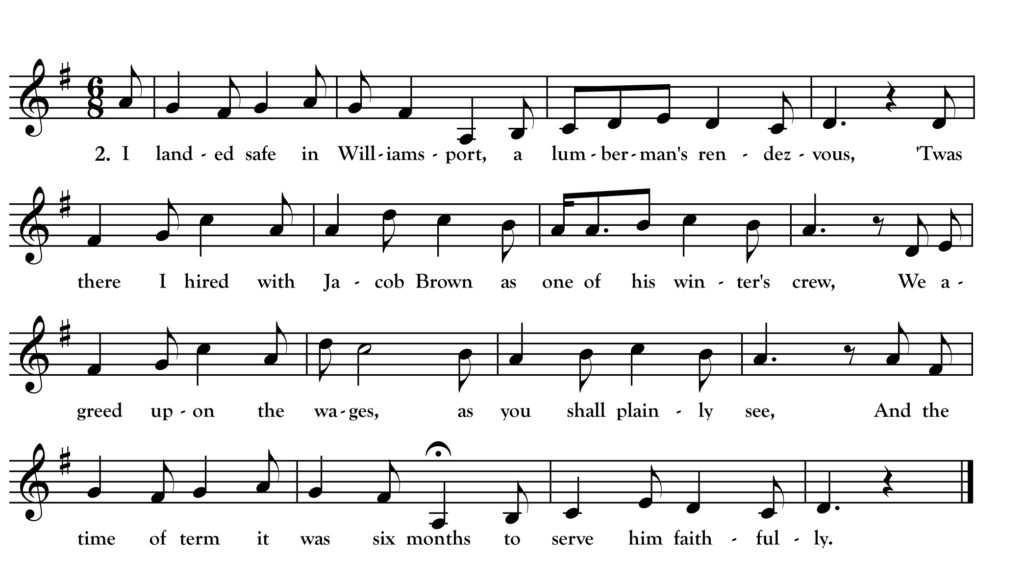The Pokegama Bear
One cold frosty morning, the winds, how they blew,
We went to the woods our day’s work for to do,
Yes into the woods we did quickly repair,
It was there that we met the Pokegama Bear.
Now, Morris O’Hern was a bold Irish lad,
He was building a fire all in a pine stub,
The ring of his ax filled the cold winter air,
When out popped the monstrous Pokegama Bear.
With a roar like a lion O’Hern he did swear,
Saying “Run boys, for God’s sake, for I’ve found a bear.”
When out of the brush Jimmy Quinn he did climb,
“To hell with your bear, kill your own porcupine.”
Now, into the swamp old bruin did go,
Bold O’Hern, and Hasty did quickly pursue,
As on through the brush those bold heroes did tear,
To capture or kill the Pokegama Bear.
Old bruin went mad and for Hasty did steer,
He braced for the blow without dread or fear,
With his teeth firmly set and his ax in the air,
He slipped and fell on the Pokegama Bear.
Now out on the tote road old bruin did go,
He thought that was better than wading in snow,
But little he knew what awaited him there,
For fate was against that Pokegama Bear.
There was old Mike McAlpine of fame and renown,
A noted foot racer on Canadian gound,
He ran up the road, raised his ax in the air,
And he dealt the death blow to Pokegama Bear.
When out to the camp poor old bruin was sent,
To skin him and dress him it was our intent,
And we all agreed that each should have a share,
Of the oil that was in the Pokegama Bear.
And next it was sent to the cook and it fried,
It was all very good it cannot be denied,
“It tastes like roast turkey,” Bill Moneghan did swear,
As he feasted upon the Pokegama Bear.
Now my song is ended, I’m dropping my pen,
And Morris O’Hern, he got the bear skin,
Here’s long life to you, boys, and long growth to your hair,
Since it’s greased with the fat from Pokegama Bear!
I am not the first Minnesotan to be fascinated by old songs that drifted into our state during the old time logging era of the 1800s. Iron Ranger John Berquist (once Minnesota’s state folklorist) was very active for much of his life in the revival and performance of regional folk music and performed several logging camp songs including “The Pokegama Bear” (pronounced “po-KEG-uh-muh”). I only had the pleasure of meeting John once before he passed away in 2016 but he was a friend to many in the Twin Cities music community and collaborated many times with Twin Cities mandolin player Bob Douglas.
I am not sure where John found the text of “The Pokegama Bear” but it is printed in Agnes Larson’s wonderful 1949 book The White Pine Industry in Minnesota as contributed by Michael McAlpine of Grand Rapids, Minnesota (who appears in the song). The song was composed by Frank Hasty (who also appears in the song) in a logging camp in 1874. The bear’s namesake, Pokegama Lake, is just south of Grand Rapids. John Berquist set the text to the “Sweet Betsy from Pike” tune so common in the lumbercamp tradition. John performed the song and gave it to Chicago folk singer Art Thieme who recorded it. I use a variant of the same tune with a couple tweaks inspired by “The Journeyman Tailor” – another song with the “Betsy from Pike” tune that was collected in the north of Ireland and printed in Sam Henry’s Songs of the People.




